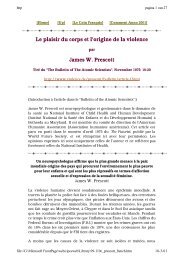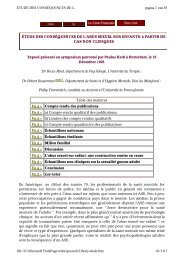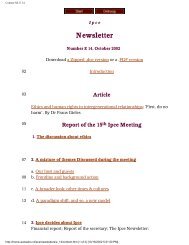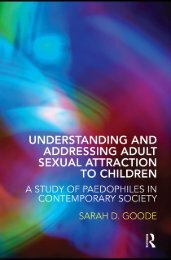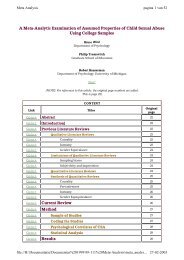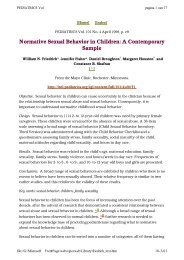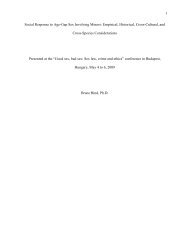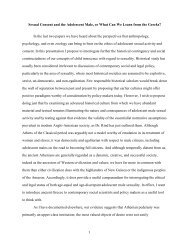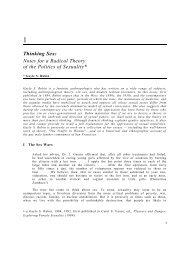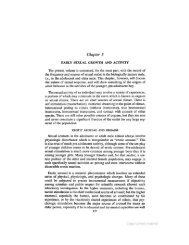Untitled - Ipce
Untitled - Ipce
Untitled - Ipce
Create successful ePaper yourself
Turn your PDF publications into a flip-book with our unique Google optimized e-Paper software.
4 - Questions<br />
7 - Research<br />
Over the next two pages, four of the most common questions<br />
about pedophilia and pedophiles will be addressed.<br />
4.1 - Can I Recognize Pedophiles?<br />
No, it is not possible to recognize pedophiles just by looking at<br />
their appearance. Pedophiles are not (just) old, dirty men.<br />
Self-oriented pedophiles are mostly men, who are either<br />
aggressive-sadistical by character or who see children as their<br />
only way to sexual satisfaction. The latter may result in (incestual)<br />
rape.<br />
Child-oriented pedophiles can be male or female, heterosexual<br />
or homosexual, and young or old. Just like self-oriented pedophiles,<br />
they can be of any race, nationality and socioeconomic<br />
class.<br />
‘Pro-pedophilia’ activism however, is primarily engaged in by<br />
male homosexual pedophiles. They feel oppressed the most,<br />
since homosexuality is still often considered morally wrong,<br />
and society mostly fears sexual assault by men.<br />
4.2 - Can Pedophiles Be Cured?<br />
That depends. It is not possible to change the main sexual<br />
orientation of pedophiles, but especially self-oriented pedophiles<br />
can learn to integrate their feelings for children and<br />
regain self-control. They still have to take the first step of no<br />
longer repressing their own feelings, but instead to face and<br />
accept these as a part of themselves. Nor will enforced ‘treatment’<br />
be able to change the sexual orientation. This results in<br />
destroying the patient’s self-respect.<br />
Since quite some time, research has been carried out into the<br />
sexual experiences of children and their possible consequences<br />
(see the bibliography on page 16). However, this is a difficult<br />
research area, because objective facts will easily collide with<br />
prejudice and beliefs about morality. These beliefs frequently<br />
cause people to label every sexual experience of children as<br />
‘abuse’. For this reason it is not surprising that research and<br />
factual data can be used to argue that there is more abuse<br />
than there might actually be, depending on the definitions<br />
given for ‘children’, ‘sexual behavior’ and ‘harmful behavior’.<br />
7.1 - Difficulties Obtaining Data<br />
Much research is conducted in psychiatric and other clinical settings.<br />
Further, much research focuses on people who claim<br />
harmful consequences from youthful sexual experience, while<br />
people who feel they have been enriched by such experiences<br />
rarely have channels open to researchers, or do not want to be<br />
open about feelings, ideas and experiences society says cannot<br />
exist or must be wrong.<br />
Often, mental problems are directly and exclusively ascribed by<br />
researchers to youthful sexual experience. When a troubled<br />
person is found out to have had such experience, a causal relationship<br />
is often assumed instantly and other possible sources<br />
of harm are ignored.<br />
Involving pedophiles in research in a balanced way is equally<br />
problematic. Most research involving pedophiles is carried out<br />
in clinics and prisons. It is predictable that ‘the pedophile’ will<br />
then seem to be a very troubled type of human being.<br />
Pedophiles who may not have mental problems and who do<br />
not suffer the trauma of an arrest and incarceration virtually<br />
Pedophiles I Page 6 Pedophiles I Page 11



